By Abdullahi Tsanni (Lead Writer)
Trachoma is a major public health issue in 44 countries and the major cause of blindness or visual impairment affecting 1.9 million people globally. It spreads through direct and indirect contact with the discharge from an infected person’s hands, clothes, nose and eyes, or through infected flies. According to the World Health Organisation (WHO), trachoma is the world’s leading infectious cause of blindness as about 13.9 million people are at risk of blindness from the disease. It belongs to a group of 20 debilitating diseases, collectively known as Neglected Tropical Diseases (NTDs), which affect about 1.7 billion people around the globe. WHO notes that NTDs remain a serious impediment to poverty reduction, socioeconomic development, and achieving Universal Health Coverage (UHC).
NTDs are present in 149 countries, largely in Africa, Asia and the Americas, where millions of people live in poverty and without access to adequate sanitation. This group of diseases — Trachoma, Leishmaniasis (black fever), Leprosy, Onchocerciasis (river blindness), amongst others, — disable, disfigure and kill many children and adults, trap communities in endless cycles of poverty, and cost developing economies billions of dollars annually. Nigeria is endemic for NTDs — it carries the highest burden on the African continent — with over 100 million people reportedly at risk of contracting at least one of the 20 NTDs.
Founded in 1950, Sightsavers is a UK-based nonprofit dedicated to fighting blindness, ending NTDs, and promoting equal rights and opportunities for people with disabilities around the globe. Since its inception, the organisation has worked to restore the sight of people in over 30 developing countries such as Nigeria, Cameroon, Zambia, and Ghana, saving their lives in the process. The organisation trains surgeons and local volunteers, who conduct cataract operations on visually impaired persons in rural communities and distribute preventive treatments at home.
Dr. Sunday Isiyaku, Country Director at Sightsavers Nigeria, said that NTDs like Trachoma, River blindness, and Schistosomiasis, are endemic in many parts of Nigeria, particularly among people in areas without adequate access to water, sanitation, and hygiene (WASH) facilities.
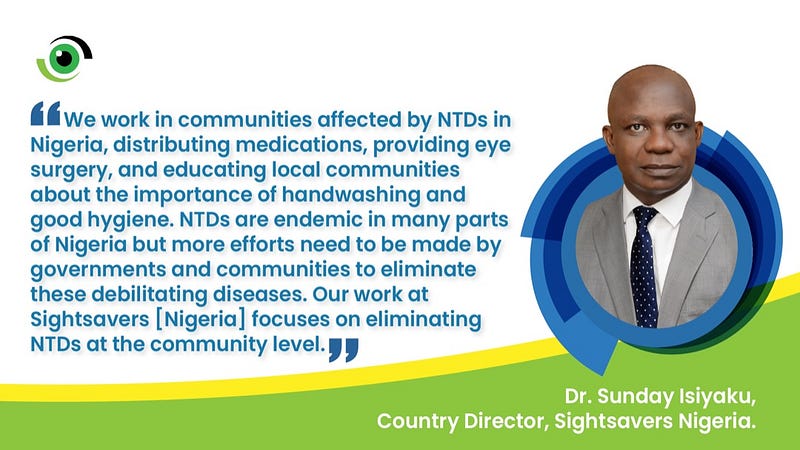
“We work in communities affected by NTDs in Nigeria, distributing medication, providing eye surgery, and educating local communities about the importance of handwashing and good hygiene.NTDs are endemic in many parts of Nigeria but more effort needs to be made by governments and communities to eliminate these debilitating diseases. Our work at Sightsavers [Nigeria] focuses on eliminating NTDs at the community level,” he said, adding that one of the things they have successfully done is establish mass drug administration programmes across states in Nigeria.
In September 2019, Sightsavers in partnership with Mott MacDonald, the Schistosomiasis Control Initiative Foundation (SCI) and the Liverpool School of Tropical Medicine (LSTM), launched the Ascend West and Central Africa programme funded by the UK Department of International Development (DFID). The programme aims to eliminate five NTDs — Trachoma, River Blindness, Lymphatic filariasis, Schistosomiasis, and Intestinal worms — in thirteen countries, including Nigeria, through the delivery of 400 million treatments by 2022.
Saving Ibrahim’s sight
It was a bright sunny day in May 2019, when a team of trained Sightsavers’ community drug distributors, under the Ascend programme, noticed suspicious signs of Trachoma in fifteen-year-old Ibrahim in Tungar Madugu neighborhood, Gwadabawa Local Government Area of Sokoto state. They screened him for trachoma and in the process, discovered that he was suffering from trichiasis, an advanced form of the disease that results in inturned eyelashes, which required surgery.
“When I found the boy his eyes looked really dim, with watery discharge. He couldn’t raise his head or open his eyes properly,” Suleiman Dayyabu, Programme Officer Trachoma Surgery at Sightsavers in Sokoto, recalled. Dayyabu explained that blindness caused by trachoma is prevented using the WHO-developed strategy known as “SAFE” — which stands for Surgery for trichiasis, Antibiotics, Facial cleanliness and Environmental improvement. He said immediately Ibrahim was identified they took him to the Usmanu Danfodiyo University Teaching Hospital, Sokoto, for further examination, and his operation was done on August 9, 2019.
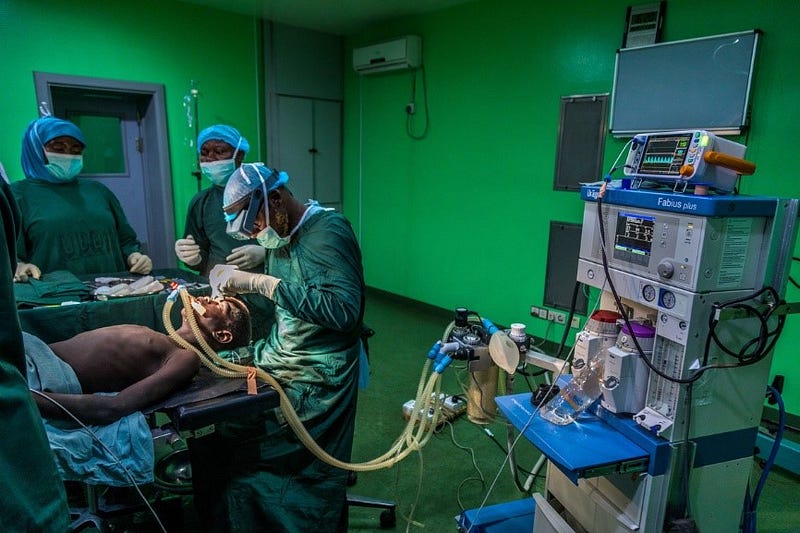
Ibrahim’s guardian, Abdullahi Danbala, said Ibrahim’s eyes went bad about two years before their intervention. It started with a discharge, which got thicker, and then the itching started. He would rub his eyes constantly, “When the weather is hot, Ibrahim’s eyes itch uncontrollably and feel worse,” said Danbala. They did not know what to do to help him. They thought that he would go blind and the entire family had resigned to that fate. Hope returned for Ibrahim and the rest of the family when they learned that Sightsavers could help Ibrahim.
Living with Trachoma affected every area of Ibrahim’s life. He couldn’t play with the boys in his neighbourhood as they would often mock him, and this saddened him. But this has changed since Ibrahim had his eye surgery last year. “Ibrahim is feeling well and can see clearly. We are farmers but before the surgery he couldn’t work on the farm or play with his friends. Now he is very okay and does all his daily activities and is always with his friends,” Danbala said, adding, “I feel excited that he can now see clearly, and I am helping identify other children affected by this disease so they can get cured.”
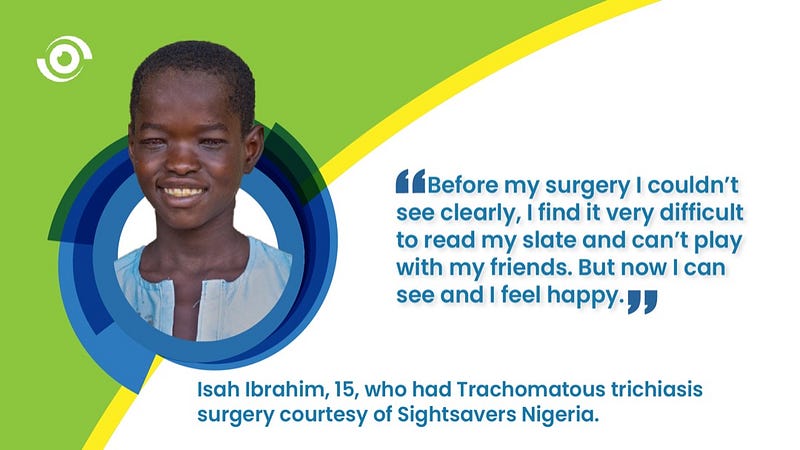
Ibrahim hopes to become a teacher. He said he would love to teach other children as it is important to get an education. “If you have an education, you know how to do things in life,” he said. “Before my surgery I couldn’t see clearly, I find it very difficult to read my slate and can’t play with my friends. But now I can see and I feel happy.”
Need for improved NTD programmes
Although Nigeria in partnership with WHO has made progress in the fight against NTDs, many programmes do not fully consider the needs of people affected by these diseases, especially people living with disabilities — their needs go beyond drug administration. Healthcare services for those living with NTDs, including Morbidity Management and Disability Prevention (MMDP) programmes aimed at managing and preventing disabilities caused by NTDs, are under-funded and poorly accessed.
Against this backdrop, in November 2018, researchers at Sightsavers Nigeria embarked on a research project to evaluate and develop MMDP services that are responsive to people affected by NTDs. The MMDP research was conducted in two states in Nigeria — Kebbi and Benue, in partnership with the Federal Ministry of Health and LSTM.
It was focused on understanding the challenges and needs of people affected by NTDs through active participation of the affected persons, and healthcare providers, using a community-based participatory research (CBPR) approach.
“We rightly spend a lot of time working to eliminate NTDs, but sometimes at the expense of considering the people behind the numbers and providing services which reflect the realities experienced by people living with an NTD,” said Martins Imhansoloeva, research coordinator at Sightsavers Nigeria.
Imhansoloeva explained that their research was aimed at understanding the daily experiences of people living with NTDs — often in the poorest and rural communities — to gain insight into their needs and the barriers they face in accessing healthcare services including MMDP programmes. He said they trained frontline health workers and people living with NTDs to be co-researchers who were involved at all levels of the research, including analysis and recommendations from the findings.
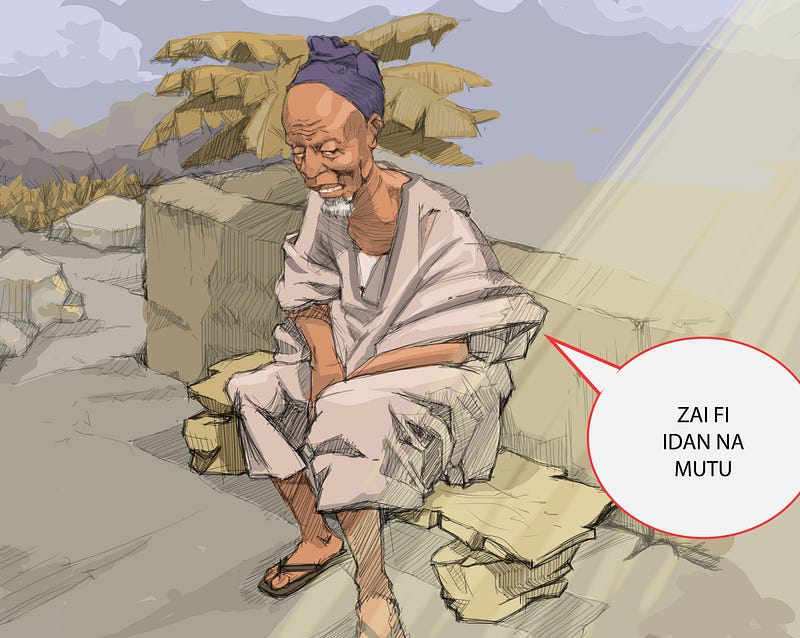
The research findings revealed that community stigma and discrimination, misinformed cultural and traditional beliefs, fear of surgery, difficulties accessing transport to take up services, worry over the cost of treatment and overstretched health workers, are some of the major challenges faced by people living with disabilities and long term impact of NTDs. In addition, many people affected by NTDs were found to be depressed because of stigma. Findings also showed that many people with NTDs preferred to be examined by health workers of the same sex
“NTD programmes rarely have input from the individuals who have been directly affected by these debilitating diseases, hence, they cannot fully grasp the challenges faced by the people they exist to support. Thus, it is very important for us to conduct this research and present our findings to policymakers and programme designers,” said Imhansoloeva.
Imhansoloeva’s research team worked with a Nigerian artist, Christian Okwananke, to create illustrations using information from their research findings to help policymakers and health workers understand what it’s really like to live with NTDs. The illustrations which include depictions of some of the social and mental health impacts of NTDs — stigmatisation, loneliness, depression — were presented to health professionals including NTD programme implementers and policymakers during a meeting held in Abuja on 20th January 2020.
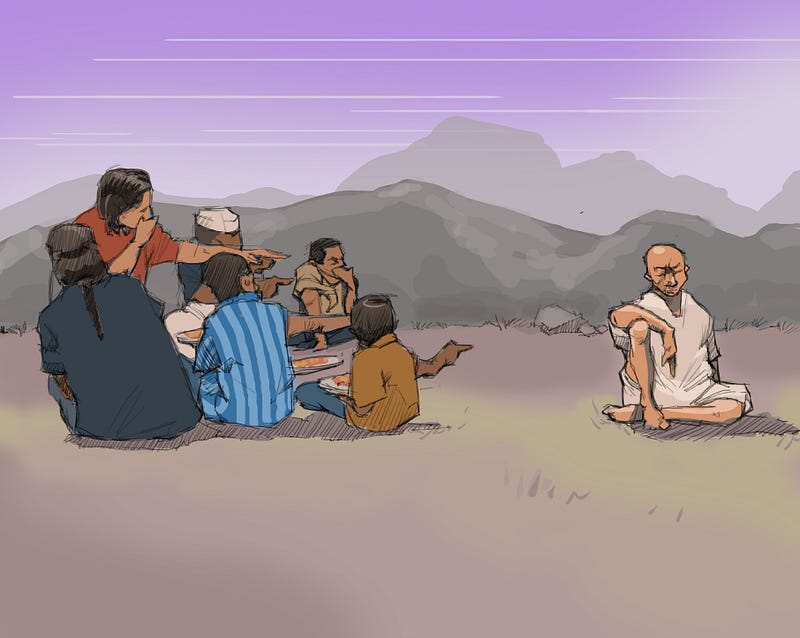
Imhansoloeva said the illustrations kick started conversations in a sensitive and non-confrontational way among health professionals, and they clearly related to the images and understood more effectively the challenges faced by their patients. “Going forward, we hope to use these illustrations as educational materials within communities to sensitise the public on the challenges of people living with NTDs, and how they can be supported, as well as debunk misconceptions around NTDs,” he said.
The experiences of people living with NTDs should be considered in policy formulation and designing of NTD programmes. In the build up to the second-ever World NTDs Day, scheduled for January 30, 2021, there is also a need for greater awareness and education on NTDs in rural communities in Nigeria, as well as increased access to adequate water and sanitation facilities to prevent the spread of the diseases.
NTDs are preventable and treatable. However, governments pay little or no attention towards the elimination of the diseases and they are less prioritized in healthcare funding. Consequently, millions of poor people affected by these preventable and treatable diseases become vulnerable, discriminated against and face social exclusion. Government needs to ensure the prioritisation of NTDs in national plans in order to accelerate their elimination in Nigeria in support of the work that organisations like Sightsavers continue to do.


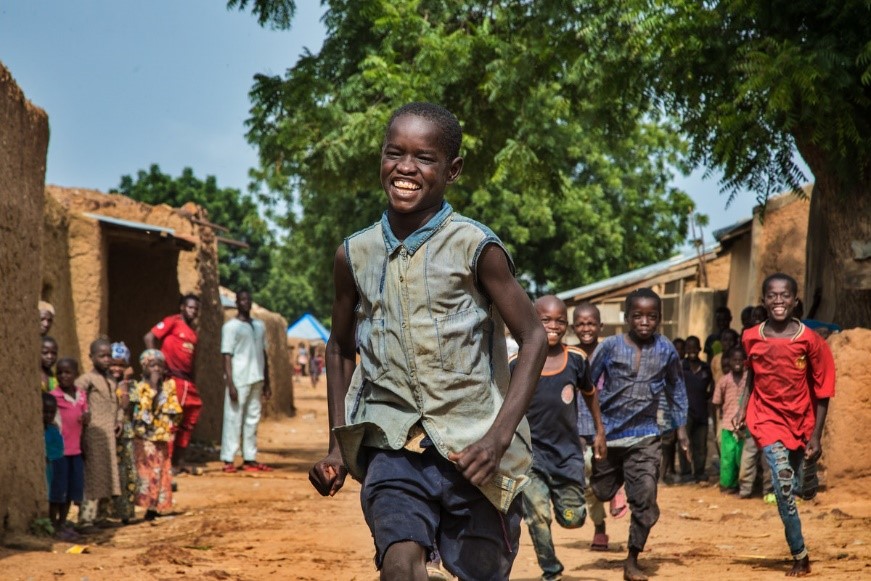
I’m proud with this organization
Thank you
You are good organisation